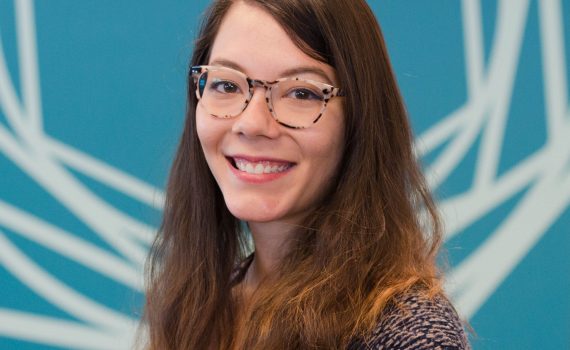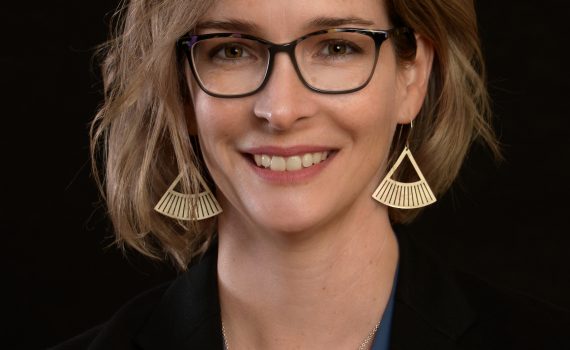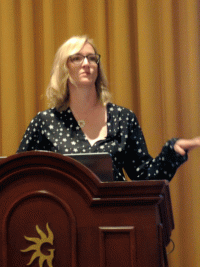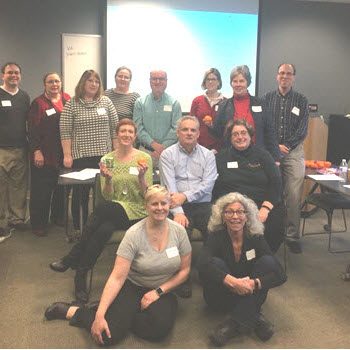
Episode 024: Gabby Pascuzzi–Vulnerability and Leaning In
Category:introversion,Introverted Leadership,introverts,Leadership,Podcast,STC,SummitPodcast: Play in new window | Download
Subscribe: Spotify | Amazon Music | iHeartRadio | Podchaser | TuneIn | Deezer | RSS
Episode 024 Show Notes: Gabby Pascuzzi
Introduction
Gabby Pascuzzi and Ben Woelk talk about the importance of vulnerability and openness in the workplace, empathy, and leaning into weakness.

Key concepts
- Remote work can be challenging because so much of communication is non verbal.
- Vulnerability and openness can be a strength
- When you lean into a perceived weakness you may find it’s really a strength
- Leaning into a weakness can help you improve that area
- Empathy is a key leadership trait
- No one started off as an expert and you do yourself a disservice if you write yourself off and say, “I can’t do that.”
Quotable
On remote work–The nuances and so much of communication is nonverbal, that you really have to work hard to make sure that you’re not misconstruing something that somebody said…making sure that your tone is appropriate and thoughtful. @gabbypascuzzi
On authenticity–at the end of the day, even if we’re writing alone, we still need our teammates. And one way to build a stronger team is to let them see who you are. @gabbypascuzzi
Being comfortable with my emotions is tied to one of my biggest strengths, which is being vulnerable and being authentic and just being really present, bringing my whole self to work. @gabbypascuzzi
Empathy helps you put yourself in other people’s shoes so that you are able to do more of this servant leadership style where you’re serving the people under you. @GabbyPascuzzi
Leaning into weaknesses, meaning things that you are not very naturally skilled at. We get so obsessed with “What is your strength?” @GabbyPascuzzi
Nobody started out as an expert and you really do yourself a disservice if you write yourself off, and say, “Nope, I can’t do that. That’s a weakness,” because you don’t know if you may have more skill then you thought or you’re able to improve. @GabbyPascuzzi
Resources or Products Mentioned in this Episode
- Next Big Idea Club
- Society for Technical Communication
- Carnegie Mellon University
- Survivor: David versus Goliath
- No Hard Feelings: The Secret Power of Embracing Emotions at Work
Links
- Follow Hope for the Introvert on Twitter
- Like my page on Facebook
- Support me on Patreon
- Get swag for Hope for the Introvert and Introverted Leadership at Zazzle
Transcript
Ben: Joining us today is Gabby Pascuzzi. Gabby is a technical writer at Tenable, a cybersecurity company. She also competed on the 37th season of Survivor: David versus Goliath. I met Gabby at the 2019 STC Summit Conference in Denver where Gabby was our keynote speaker for our Honors event. Gabby shared her experience as a contestant on Survivor: David versus Goliath. Her presentation was well received and one of the hits of the conference. You can follow Gabby on Twitter @GabbyPascuzzi. I encourage our listeners to visit HopefortheIntrovert.com where you’ll find complete show notes including a transcript of today’s conversation.
Ben: Hi Gabby!
Gabby: Hi Ben.
Ben: I’m excited that you’ve agreed to join us today. I’m very much looking forward to chatting with you. I’m sure we will chat about Survivor, but I’d like to talk a little bit about your career in general, and we’re going to talk about weaknesses and strengths and how those should maybe be handled in life and in the workplace. So you work at Tenable, I’m in Cybersecurity, so I’m actually familiar with Tenable, but can you tell us a little bit about what you do for them and what your workplace is like?
Gabby: Yeah, so I have been a technical writer at Tenable for a year and a half now. And I write mostly user documentation, our user guides for a couple of different products. One is Nessus, which is a vulnerability scanner. Another is Tenable IO, which is our platform. And yeah, a lot of user guide content which is pretty, pretty fast. We are always coming out with new features. So we do work in an agile environment.
Gabby: I have only been a technical writer for–this is my fourth year, so this is pretty early in my career and I’ve found that it’s been really challenging, but really interesting. And another challenge that has come with working for Tenable, which is one of the things I love as well, is it’s largely a remote company. So a lot of the employees are remote. The headquarters is in Maryland, but I live in Virginia and we do a lot of our coordinating and communicating through Slack and through Zoom calls, and we have people not only in this area, but also spread across the country and sometimes in different countries. We have some people in Ireland, some people out of India, so it’s a very global company, which makes for an interesting workplace at times. But yeah, very fast moving and I’m excited to be working for them.
Ben: What led you into technical writing as a career?
Gabby: I had no idea that technical writing existed until right before I graduated from college. I went to school at Carnegie Mellon University in Pittsburgh and I majored in Linguistics, and then I added a second major, which was in the English Department called Professional Writing, which is–I always laugh because what’s the opposite of that? Like unprofessional writing? But, they had a few technical writing classes and I had always been pretty technically minded. I always did well in science and I had taken an introductory computer science course at CMU, which is a school that’s kind of known for that.
Gabby: I found that the technical writing classes really merged my skills in writing, which I had always been interested in English and writing, but I had never been particularly creative. I was always more on the technical side. So that’s when I discovered that technical writing existed and allowed me to really combine those two skills.
Ben: Yeah, it’s interesting. I took linguistics classes in college also, though I actually did an anthropology undergraduate, which I’m certainly not doing that now, but I found the linguistic stuff absolutely fascinating–just how much it could inform a culture and tell you about a culture, but also in some ways determine how a culture acted in some ways. So it was always a really, really interesting field. I didn’t go there, but it’s definitely an interesting field. So do you work as part of a team at Tenable? How often do you see each other?
Gabby: Yeah, so I am part of our technical writing team and there are 10 of us and we have a manager that’s just our manager for the technical writers, but each one of us focuses on a different product. And so then we’re also integrated onto those development teams. I’m pretty well connected to the developers for the products I write about as well as the product managers. And as you know, with all of us tech writers we’re always talking to everybody. So you get to know a lot of people, even though I’m not seeing them all face to face all the time, and my team gets together at least once a quarter, which I feel like is important for us to have that bonding time and remember that each other are people, not just our little screens. We Zoom call a lot so we make sure to do video calls. So we do see each other face to face, which I feel like is important in a remote context, because you don’t want to just always be communicating via Slack message or email and then you really–you don’t even know what the other person looks like or sounds like and you lose some of that personal touch.
Ben: Yeah. It’s interesting because at the Summit conference where I met you there was one woman I had been mentoring for the last three years, and we’d never seen each other face to face. We’d seen each other on our screens through Slack calls or whatever. But it was so funny. It’s, “Oh, you’re really tall,” and all that sort of thing, which you obviously can’t tell that when you’re just talking virtually, but I agree. I think that face-to-face connection makes such a dramatic difference in terms of–well you catch nuances that you wouldn’t catch otherwise and just getting to know each other a little bit better.
Gabby: Yeah, definitely. I mean, working for a remote company definitely has its pros and cons and a pro is that you really have awesome team members that are not limited by geographic location. Right. We have some brilliant people that they happen to live a state over so they can’t come into headquarters, so it’s great in that way. But yeah, there are drawbacks, which is that you don’t have those face to face. I agree with what you said, the nuances and so much of communication is nonverbal, that you really have to work hard to make sure that you’re not misconstruing something that somebody said as well as you have to make sure your intentions are clear when you’re just chatting over Slack, making sure that your tone is appropriate and thoughtful. And that is, that’s relevant to us as writers, you know, because we care about our tone, but definitely something to keep in mind.
[bctt tweet=”On remote work–The nuances and so much of communication is nonverbal, that you really have to work hard to make sure that you’re not misconstruing something that somebody said. @gabbypascuzzi” username=”hopeintrovert”]
Ben: Yeah, definitely. So I have a question. For our listeners, one of the things that we do, is our guests fill out a questionnaire and they describe themselves in the questionnaire. And Gabby described herself as an awkward extrovert, which is interesting. And I was curious, what do you mean by that and how does that play out?
Gabby: Yeah. So when you asked me to be a part of your podcast, the first thing I said to you was, “You know, I’m not really an introvert. I am actually an extrovert”, but I can relate to introverts because I can be awkward and I can be shy at times. And not to call introverts awkward and shy [laughing], but I feel like a lot of introverts might describe themselves that way. So to me it means that I am extroverted. I really get my energy from being around people, talking to people. That’s how I recharge. I’m very outgoing, but there are definitely times where I find it hard to reach out, especially if it’s someone that I don’t know very well. And so there’s definitely a little bit of a hump for me to get to that extroverted part of myself.
Gabby: Being an awkward extrovert is also sometimes challenging in my remote workplace because, for all of us as technical writers, we have to initiate a lot of conversations because we need to ask somebody for information. We need to ask for clarity; we need to ask for reviews. So it’s hard because a lot of technical writers are introverted or are a little awkward, when really we need to be very bold and not shy. And that can be really hard for a lot of us. It’s hard for me and it’s something that I’ve definitely had to work at, just being confident that, okay, I’ve got to get an answer so I’ve got to reach out and you really can’t be too shy about it.
Ben: Okay, awesome. So what do you see as your main weaknesses and strengths?
Gabby: I think my weaknesses and strengths are very linked and I feel like that’s true for a lot of us. So when I think about my weaknesses, I think about things that affect me. Sometimes I can be a little disorganized. Sometimes I have a hundred ideas at once. I like to multitask. And that can be challenging. Things that other people have said are weaknesses of mine, and this actually for me, it came out in the context of Survivor, which I’m sure we’ll talk more about later, is that I am a person that definitely wears her emotions on her sleeve. [laughing] So I think that some people might view that as a weakness because you’re in a workplace, you’re in a professional place, and it’s not to say I’m having emotional breakdowns in the middle of the workday, but I’m pretty open with my emotions, and some people might take issue with that, and I think it ties in perfectly to what is my strength.
Gabby: And I actually feel that being comfortable with my emotions is tied to one of my biggest strengths, which is being vulnerable and being authentic and just being really present, bringing my whole self to work. I don’t feel like I bring a fake version of myself to work. And, what that means to me is that I’m able to show up and connect with my peers, my coworkers, and not just be a robot behind a screen. Especially, like I said, especially if we’re just talking over Slack, somebody that’s just asking for this, asking for that, let’s get the job done with no sense of personability. Is personability a word? [laughing].
[bctt tweet=”Being comfortable with my emotions is tied to one of my biggest strengths, which is being vulnerable and being authentic and just being really present, bringing my whole self to work. @gabbypascuzzi” username=”hopeintrovert”]
Ben: Sure. We’ll go with it.
Gabby: The thing is, as writers and as linguists, we can just make up words. But yeah, if you’re not bringing your authentic self to work, I feel like you’re missing out on an opportunity to build those connections with your peers.
Gabby: And at the end of the day, even if we’re writing alone, we still need our teammates. And one way to build a stronger team is to let them see who you are. And that doesn’t mean that there shouldn’t still be boundaries and that there aren’t things that are appropriate and not appropriate to talk about or to show at work. But when you’re able to be–have a little fun and tell people when you are really excited about something or tell your teammates, “I’m really frustrated about this, can I vent to you for a second?” And maybe you’ll find out that they’ve been experiencing the same issues too. And what can you guys do about it? Maybe you can trouble–you can brainstorm how to fix this issue. Maybe it’s a culture issue that you guys are going to bring up in your next team meeting, but that really isn’t possible unless you are open and show up every day. So that was a long answer to your question.
[bctt tweet=”On authenticity–at the end of the day, even if we’re writing alone, we still need our teammates. And one way to build a stronger team is to let them see who you are. @gabbypascuzzi” username=”hopeintrovert”]
Ben: No, but it’s very interesting issue because I think for most of us in the workplace, the idea is that–maybe the idea is that you squashed down your emotions and you do your work and then you some ways you are not yourself in the workplace. There was–actually part of the Next Big Idea Club, which is a book club, which I don’t read nearly as many of them as I should, but one of their recent offerings is called No Hard Feelings: The Secret Power of Embracing Emotions at Work. And that’s by Liz Fosslien and Mollie West Duffy. And that one gets very much into really being, I think completely at the workplace and recognizing that you need to be able to share your emotions. And I think that’s in some ways it’s a corrective, I think to a lot of the business type writing that’s been out there in terms of what are we supposed to be like in the workplace. We’re supposed to be very just not emotional or just always focusing on work. So I think it’s a really interesting discussion and an interesting thing for a lot of people.
Gabby: Yeah, definitely. That book sounds really interesting. I am going to have to take note of that and read that. It’s something that I’ve thought a lot about. Can we have emotions at work that are appropriate and be more authentic? Rather than squashing them down because everybody knows what happens when you squash down emotions. They are going to bubble up. And I don’t think people at your workplace would like that very much either, if suddenly there was an explosion of emotions that you had been letting pent up, because you weren’t comfortable talking through anything that came up. And I think with emotions and with emotional intelligence also comes empathy. And empathy is very important for interpersonal skills in the workplace, especially if we’re talking about leadership skills. Empathy is one that I feel you must have as a leader; it helps you understand if you have people below you, it helps you relate to them. It helps you put yourself in other people’s shoes so that you are able to do more of this servant leadership style where you’re serving the people under you.
[bctt tweet=”Can we have emotions at work that are appropriate and be more authentic? Because everybody knows what happens when you squash down emotions. They are going to bubble up. @gabbypascuzzi” username=”hopeintrovert”]
[bctt tweet=”Empathy is very important for interpersonal skills in the workplace, especially if we’re talking about leadership skills. @gabbypascuzzi” username=”hopeintrovert”]
[bctt tweet=”Empathy helps you put yourself in other people’s shoes so that you are able to do more of this servant leadership style where you’re serving the people under you. @GabbyPascuzzi” username=”hopeintrovert”]
Gabby: And I know for me, I’m not in a real leadership position in my team. I’m a technical writer. I’m on the same level as a lot of my peers. But for example, in a group discussion, so once every two weeks we have a group meeting where we revisit our style guide and we make decisions on outstanding items where we haven’t come up with a standard for our style, or we revisit past decisions if they’re not working for us. And it’s definitely a group conversation. And I think when you are empathetic, for example, in that situation, you’re able to understand everybody’s viewpoints and listen to each person fairly and not be biased and not take things personally if somebody’s opinion doesn’t agree with yours. So in that kind of situation, empathy really is key.
Ben: And I think that gets back to our comments early on about nonverbal communication. And I’ve just seen too many times somebody gets an email and they read it–I’m assuming they misread it in terms of the emotion or the intent that was behind it. But having that ability to see each other face to face and catch those nuances is critical as well.
Gabby: Definitely. Yeah. So many times things can get misconstrued. And I think if we all just try to remember that most people are coming from a good place and things usually are not personal in the workplace, then hopefully we can avoid some of that. And that also comes with lowering your guard a little bit and not being so on defense. Right? If you’re always playing defense, then you’re possibly going to take things as a personal attack, when really it may have just been somebody posing an alternative and it’s nothing personal against you. And the more empathetic you are able to be, the more open minded and emotionally intelligent that you are, the easier it will be for you to listen to feedback like that and not take it super personally.
[bctt tweet=”The more empathetic, the more open minded and emotionally intelligent that you are, the easier it will be for you to listen to feedback and not take it super personally. @GabbyPascuzzi” username=”hopeintrovert”]
Ben: Yeah, and I think it’s hard. For instance, if I have an idea of doing something in a different way and I’m very, very invested in it and I’m very, very passionate about it, but then it’s not received well, it’s very hard for that not to feel like there’s a personal element there. Mainly because I’ve probably invested too personally in whatever the idea was.
Gabby: I’m definitely guilty of that. Yeah. I’ve seen it go that direction as well. And it’s really hard sometimes to not feel attached to your work because we do care about it so much. And you know that that happens to me even with things as simple as I send things for a peer review and they didn’t like the word I chose. And I’m like, “What do you mean? I really thought about that word.” Because you really have to remind yourself sometimes it’s not personal. If you’re on a team, you’re working together to create the best outcome and there are always going to be differences of opinion.
Ben: Yeah. It’s funny because you’re gonna get that. But that was, what do they, what are they saying about me if they don’t like my word, you know? Yeah. It’s funny. Don’t they appreciate me?
Gabby: Yeah, definitely.
Ben: Gabby, one thing that you had mentioned to me before we started recording today, was this idea of leaning into weakness. And when we had talked about leaning in, you said it wasn’t necessarily in the sense of the book for women in the workplace called Leaning In. Can you expand on that a little bit? What do you mean by leaning in and especially in the leaning into your weaknesses?
Gabby: Yeah, I am very big on this idea of leaning into either what you perceive to be your own weaknesses or what others perceive to be your weaknesses. When I think about the idea of leaning into your weaknesses, I see two halves to this. One is the idea that what people may see as a weakness is not really a weakness. So by leaning into it, you’re really highlighting a strength of yours. So for example, like I mentioned before, as a person myself who is very in tune with her emotions, some people may see that as a weakness. I see it as a strength. So if I know that I can’t really help but be emotional, let me think about how I can use that as a positive influence in the workplace.
[bctt tweet=”Leaning in is the idea that what people may see as a weakness is not really a weakness. So by leaning into it, you’re really highlighting a strength of yours. @GabbyPascuzzi” username=”hopeintrovert”]
Gabby: So can I use it to connect with a coworker that is having a bad day? And I’m able to empathize with them and we’re able to talk and, and I help then refocus is, is it possible for me to use my emotions, my emotional intelligence to have a tough conversation with a manager about a culture problem that I see that needs to be addressed that I noticed because I’m in tune with my emotions. So I think when you lean into something that is supposedly a weakness, it actually might highlight it as a strength.
Gabby: The other half of it is leaning into weaknesses, meaning things that you are not very naturally skilled at. So I really feel like sometimes we get so obsessed with “What is your strength?,” “What are your strengths, what are your strengths? “And that’s great. We should also be doing jobs that highlight our strengths. However, you don’t want to become so scared of leaving your comfort zone that you never try anything new. For example, if I am scared of public speaking and I consider that a weakness of mine, what if you really tried to lean into that and signed up for a toastmasters club or went to a public speaking class or volunteered to lead the next meeting that your team was having? If you really try to push yourself outside of your comfort zone and do things that make you uncomfortable, I wonder if you might discover that it’s not as big of a weakness as you may have thought.
[bctt tweet=”Leaning into weaknesses, meaning things that you are not very naturally skilled at. We get so obsessed with “What is your strength?” @GabbyPascuzzi” username=”hopeintrovert”]
[bctt tweet=”If you really try to push yourself outside of your comfort zone and do things that make you uncomfortable, I wonder if you might discover that it’s not as big of a weakness as you may have thought. @GabbyPascuzzi” username=”hopeintrovert”]
Ben: Well, I think you also have the perception when looking at someone who’s been speaking for a while, that they’ve always been a good speaker. And I think realizing that it is a process. And it’s a learning process and that goes from everything from initial podcasts as opposed to 20 episodes in, to being willing to speak in front of a team meeting to maybe addressing several hundred people like you did at the STC Honors Event. I think what happens is I think you get more comfortable with it the more often that you do it in that example and I think the leaning into that weakness or knowing it’s something that you want to maybe turn into a strength. I think makes a lot of sense.
Gabby: Yeah, I definitely agree. We really have to remember that not everybody–actually, nobody started out as an expert and you really are just doing yourself a disservice if you write yourself off, and say, “Nope, I can’t do that. That’s a weakness. I don’t do that. I’ve never done that. And I never will do that,” because you don’t know if you may have more of a skill there then you thought or just that you’re able to improve from where you were at one point.
[bctt tweet=”Nobody started out as an expert and you really do yourself a disservice if you write yourself off, and say, “Nope, I can’t do that. That’s a weakness,” because you don’t know if you may have more skill then you thought or you’re able to improve. @GabbyPascuzzi” username=”hopeintrovert”]
Ben: Well that’s awesome. I think there’s some very good things here. And Gabby, I’d like to thank you for being on the podcast and I’m looking forward to our next time together and we will, I promise our listeners, we will talk about Survivor.
Extras



 Alisa Bonsignore is the principal of Clarifying Complex Ideas, a strategic communications consultancy in the Bay Area with clients around the world. Alisa Bonsignore and Ben Woelk discuss public speaking and the stress and value of Q&A, and how being an introvert with the INFJ temperament type affects her roles.
Alisa Bonsignore is the principal of Clarifying Complex Ideas, a strategic communications consultancy in the Bay Area with clients around the world. Alisa Bonsignore and Ben Woelk discuss public speaking and the stress and value of Q&A, and how being an introvert with the INFJ temperament type affects her roles.


 Temperament-based Strategies for Excelling in the Workplace
Temperament-based Strategies for Excelling in the Workplace






